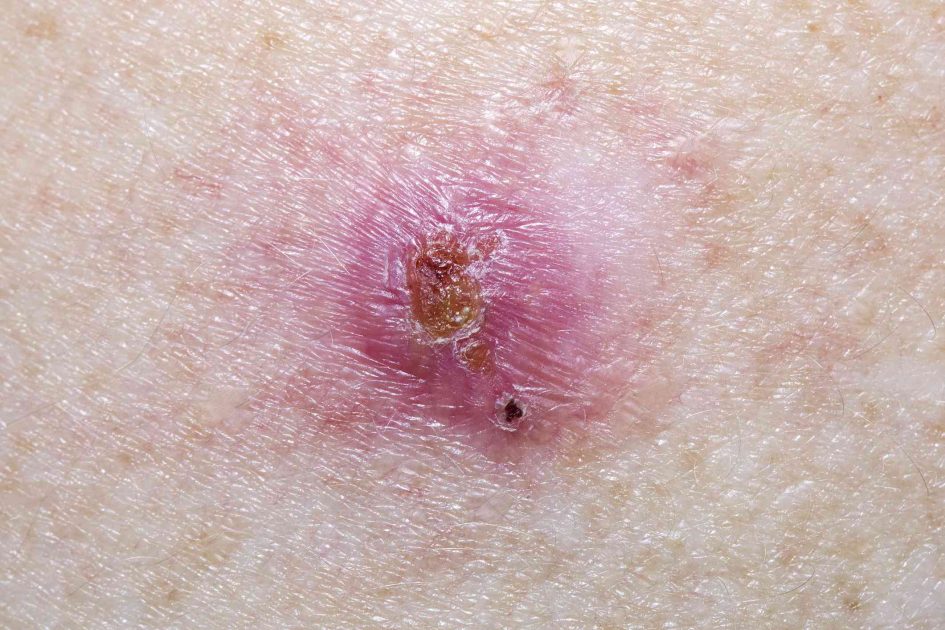Basal Cell Carcinoma (BCC)
 Basal cell carcinoma is cancer of the basal cells. These cells exist within the skin and are responsible for producing new skin cells as the old ones die. The primary goal of treating basal cell carcinoma is removing the cancer completely. The best treatment for you depends on the location, type, and size of the cancer.
Basal cell carcinoma is cancer of the basal cells. These cells exist within the skin and are responsible for producing new skin cells as the old ones die. The primary goal of treating basal cell carcinoma is removing the cancer completely. The best treatment for you depends on the location, type, and size of the cancer.
It also depends on your individual preferences and dedication in keeping up with follow-up visits. Texas Surgical Dermatology, led by board certified dermatologist Dr. Tri H. Nguyen, provides treatments for basal cell carcinoma skin cancer (BCC) to patients in Houston, Katy, Spring, The Woodlands, Texas, and surrounding communities.
Surgical Treatments
Basal cell carcinoma is usually surgically treated for removing all cancerous cells and a margin of healthy tissue surrounding it. These are a few techniques used:
- Surgical excision
The doctor will cut out cancerous lesions and surrounding healthy skin in this procedure. The margin will be examined using a microscope to ensure that there are no more cancer cells present. Excision is usually recommended in cases where a recurrence is less likely, such as hands, feet, chest, and back.
- Mohs surgery
Your doctor will remove the cancer one layer at a time during Mohs surgery. They will examine each layer using a microscope to ensure that no abnormal cells exist. This allows the plastic surgeon to ensure that the entire growth is removed. It also prevents the removal of an excessive amount of healthy skin around it.
Mohs surgery may be recommended if the basal cell carcinoma has a high risk of recurring. This is usually the case with cancer cells that are larger, extend deeper into the skin, or are located on the face.
Other Treatments
These are a few other treatment options:
- Curettage and electrodessication (C and E)
C and E treatments remove the surface of the cancer using a curet or a scraping instrument. The area is then seared through an electric needle. C and E is a good option for treating small basal cell carcinoma which are not highly likely to recur. For instance, the ones that form on the hands, feet, chest, and back.
- Radiation therapy
This makes use of high-energy beams, like protons and x-rays for killing the cancer cells. Radiation therapy may be used after surgery in cases with a high risk of recurrence.
- Freezing
This treatment freezes cancer cells using liquid nitrogen (cryosurgery). This is a poignant option for treating superficial skin lesions. Freezing may be done after curetting for removing the skin cancer surface. Cryosurgery may be considered for treating thin and small basal cell carcinomas in case surgery is not an option.
Topical Treatments
Prescription ointments or cream may be considered for treating thin and small basal cell carcinomas when surgery is not an option.
Photodynamic Therapy
This therapy combines photosensitizing light and drugs for treating superficial cancers. A liquid drug is applied to the skin in this therapy. The drug makes cancer cells sensitive to light, which are then destroyed by shining a light.
Board certified dermatologist Dr. Tri H. Nguyen at Texas Surgical Dermatology receives patients from Houston, Katy, Spring, The Woodlands, Texas, and nearby areas for basal cell carcinoma (BCC) skin cancer treatment.
For More Information contact our Board Certified in Dermatologists at Texas Surgical Dermatology in Spring, TX
For more information on procedures and treatments offered at Texas Surgical Dermatology PA please call 832.663.6566 or click here to contact our dermatologists. Helping patients in Houston, The Woodlands, Spring, Katy and other surrounding areas of Texas.

